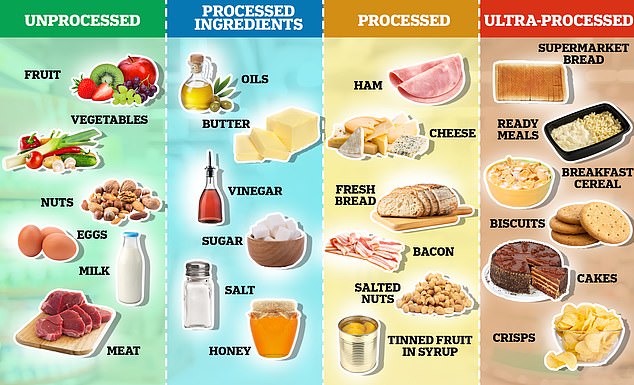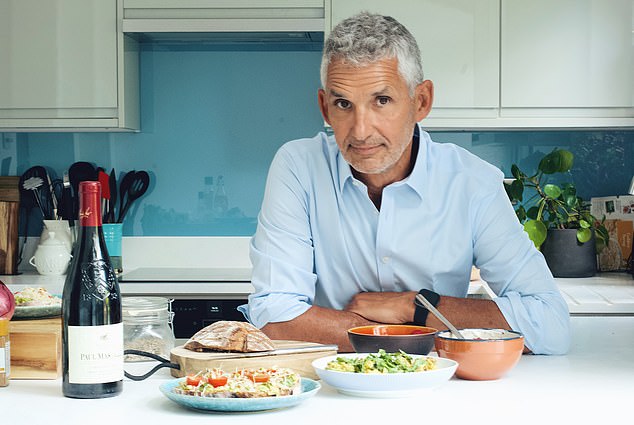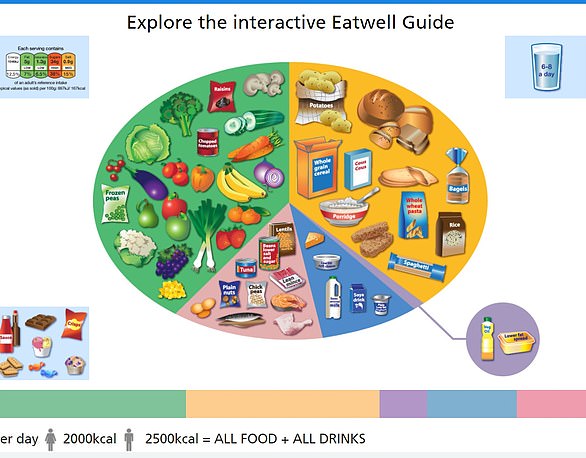An ‘anti-diet’ has helped weight loss hopefuls lose more than two inches off their waist in just 18 weeks.
Scientists say the personalized regimen, based on results from stool samples, reduces hunger by filling people with fiber.
The diet, created by renowned expert Professor Tim Spector and his team, also helps people feel and sleep better.
No food is “off-limits” under ZOE’s program, which instructs users not to worry about counting calories.
Its goal is to create sustainable eating habits, hence its “anti-diet” label.
Launched in the UK in 2022 and pioneered by Tim Spector (pictured), professor of genetic epidemiology at King’s College London, the ZOE plan is part diet programme, part health programme, and part study of nutritional science.
Users are typically advised to avoid large amounts of dairy, processed carbohydrates, and alcohol.
Instead, they are recommended to consume fermented foods rich in fiber, such as oily fish, whole grains, nuts, seeds and legumes.
Fiber-rich weight loss remedies have racked up millions of views on TikTok in recent weeks, and one viral sensation, Oatzempic, claims to help people lose up to 40 pounds (18 kg) in two months.
The “miracle” breakfast, a mixture of water, oats, a pinch of cinnamon and a squeeze of lime, is claimed to help reduce hunger and keep users fuller for longer due to its content of beta-glucan, a type of Soluble fiber.
Researchers from Kings College London, affiliated with ZOE, divided 347 obese volunteers, aged 52 and with an average BMI of 34, into two groups.
More than half (177) received an 18-week ZOE membership, where users were sent home tests including blood and stool sample kits that typically cost almost £300.
These are sent to a laboratory to calculate blood fat, blood sugar and gut microbiome levels.
Using the results, ZOE, which has a waiting list of more than 200,000 people, rates 1.2 million foods from zero to 100, giving users personal advice on how their body responds to each one.
The app, which costs £59.99 a month, also offered them diet and lifestyle advice over the four-month period.
The other 100 volunteers received a standard “Dietary Guidelines for Americans” booklet, along with a video tutorial, online resources, and weekly check-ins to encourage compliance with a weight loss attempt.
The volunteers underwent a health check before and after the trial, in which waist circumference, blood pressure, and glucose and cholesterol levels were measured.
In addition to losing 6.3 cm from their waist, participants who followed the ZOE strategy lost 4.7 percent of their weight (4.78 pounds or 2.17 kg), on average.
For comparison, volunteers who were asked to follow standard dietary recommendations promoted by US health chiefs lost 2.4 percent of their weight (0.6 pounds or 0.3 kg). and 5.35 cm waist.
The ZOE group also experienced a larger drop in cholesterol, 0.4 mmol/L, compared to 0.1 mmol/L.
The study, funded by ZOE, also found that the group was twice as likely to feel less hungry and four times more likely to report better sleep quality.
writing in the diary Nature Medicine, the researchers said: ‘In our multilevel personalization approach, the observed weight loss was moderate and was below the proposed clinically significant thresholds (five percent).
“However, moderate weight loss of this magnitude has been reported to improve health outcomes.”
Responding to the study results, Professor Spector said: “We have shown that those who follow ZOE’s nutritional advice will see improvements in their overall health.”
“It is clear that some of the current public advice is outdated, focuses too much on calories and low-fat foods, and low adherence is unlikely to produce long-term benefits.
‘ZOE’s advice shows that thinking about food in a totally different way, with an emphasis on quality, personalization and gut health, can have huge benefits if adopted more widely.
“This is now a publicly available product in the US and UK that has been shown through clinical trials to work better than official public advice.”

The Nova system, developed by scientists in Brazil more than a decade ago, divides foods into four groups based on the amount of processing they have gone through. Unprocessed foods include fruits, vegetables, nuts, eggs, and meat. Processed culinary ingredients, which are not typically eaten alone, include oils, butter, sugar, and salt.
Dr Sarah Berry, chief scientist at ZOE, also told MailOnline: “What the trial shows is that ZOE’s approach of providing personalized nutrition can help people lose fat around the abdomen and improve their health, by at the same time they have more energy and feel less hungry.
‘It’s the antithesis of the restrictive, prescriptive diets we’ve seen that exclude entire food groups and leave people hungry and tired.
‘And it works better than standard care, even when people closely followed the generalized advice in the control group. ZOE is a way to improve your health for life.’
The latest NHS data shows that 26 per cent of adults in England are obese and a further 38 per cent are overweight but not obese.
Semaglutide, the active ingredient in Ozempic, It has been shown to help users lose up to 33 pounds (15.3 kg) on average in about a year.
Ministers plan to hand out the drug to millions of overweight Britons to cut the country’s swollen benefits bill. Over time, children could also receive the injections.



